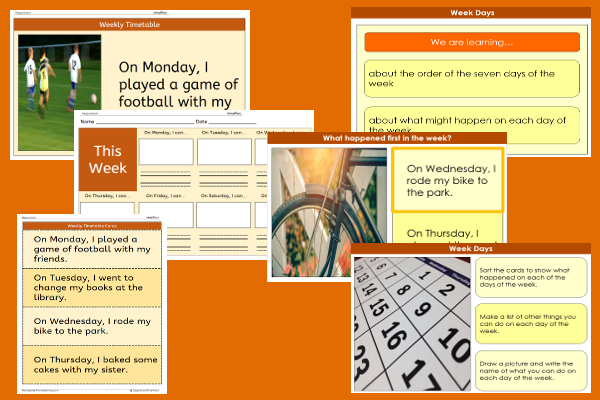Home > Foundation Stage > Numeracy > Measurement > Time > Calendar Days
Week Days

This numeracy topic teaching pack for the Foundation Stage gets the children to explore how to identify and sequence some of the special events and experiences that can happen on different days of the week.
The class can practise making an example timetable to show the sequence of the seven days of the week when indicating some of things that they can do with family and friends on each day.
Download this teaching pack including display posters, classroom activities and an interactive presentation to explore how to identify and sequence some of the special events and experiences that can happen on different days of the week
Activities in this teaching pack include display posters to identify and sequence events and experiences that can happen on different days of the week, a set of cards to order a calendar for the seven days of the week and a template to build a timetable showing events and experiences that could happen over one week.
The interactive presentation gets the children to explore and sequence events and experiences that can happen on different days of the week.
This lesson is part of a numeracy scheme of work to get the children to identify and record the sequence of the seven days of the week using the correct vocabulary words to describe units of time on a calendar. There are teaching activities for shared learning, differentiated worksheets to support independent learning and interactive presentations to introduce concepts and key skills.
-

Garden Measurements
Practise using vocabulary words and non-standard measurements to find and compare the length of different things that can found in a garden
-

Family Holiday
Identify and recount events and experiences to describe what happened when on holiday at the seaside using sentences in the past tense
-

Money Shopping
Investigate and model some of the number skills that need to be used when working with money on a shopping trip
-

Supporting Others
Explore how to build strong and positive relationships with other pupils at school and family members at home through different situations and scenarios
